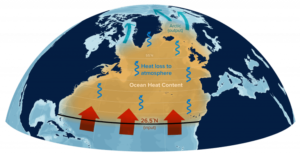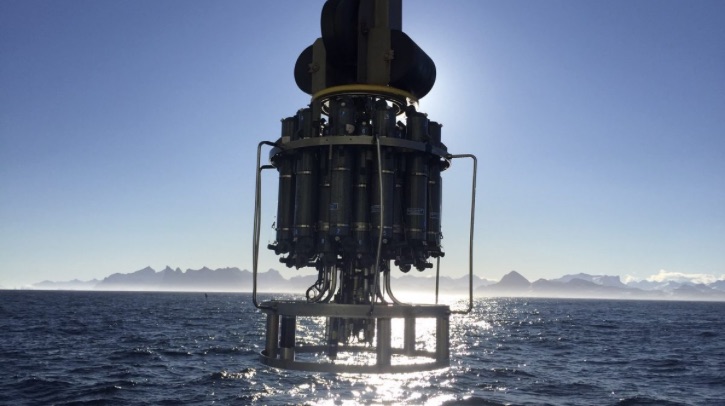A team of scientists from Woods Hole Oceanographic Institution (WHOI) have reviewed air-sea heat fluxes and 24 Coupled Model Intercomparison Project (CMIP) models to understand how the Atlantic Meridional Overturning Circulation (AMOC) has changed, and how its distribution of the ocean’s heat, moisture and nutrients will continue to regulate the Earth’s climate and weather in the future.
In a new paper, published in Nature Communications, scientists found that the AMOC has not declined in the last 60 years. Authors Nicholas P Foukal, adjunct scientist in Physical Oceanography at WHOI and assistant professor at the University of Georgia; Jens Terhaar, affiliated scientist at WHOI and senior scientist at the University of Bern; and Linus Vogt, a visiting student at WHOI when he started to work on this study and now a scientist at LOCEAN, Sorbonne Université, said that their results mean that the AMOC is currently more stable than expected.
“Our paper says that the Atlantic overturning has not declined yet,” said Foukal, who conducted the research while at WHOI. “That doesn’t say anything about its future, but it doesn’t appear the anticipated changes have occurred yet.”
Overturning old findings
These findings contrast with previous work, notably a paper from 2018 cited in this study, which reported that the AMOC has declined over the last 70 years. This past work relied on sea surface temperature measurements to understand how the AMOC has changed, but the team “learned that sea surface temperature doesn’t work as well as initially thought,” said Terhaar, who began leading this study at WHOI as a postdoctoral scientist and completed the work in Bern.
To address the uncertainty, Terhaar and the team relied on new data from the CMIP, and climate-earth models produced by the World Climate Research Program. They used 24 CMIP models and found that the most recently available surface temperature data did not accurately reconstruct the AMOC. To go a step further, the researchers looked at a different measure: air-sea heat fluxes, which is the exchange of heat from the ocean to the atmosphere. When the AMOC is stronger, more heat is released from the ocean to the atmosphere over the North Atlantic.
The authors derived this AMOC proxy with the CMIP models, then applied it to observational data. The study authors focused on two reanalysis datasets that extend back to the late 1950s to reconstruct the AMOC.

Surprisingly stable results
“Based on the results, the AMOC is more stable than we thought,” Vogt said. “This might mean that the AMOC isn’t as close to a tipping point as previously suggested.”
The paper states that air-sea heat flux anomalies in the North Atlantic are tightly linked to the AMOC and that “the decadal averaged AMOC has not weakened from 1963 to 2017”. Since there are many processes that lead to large year-to-year variability in the AMOC, the air-sea heat flux and the AMOC are correlated most strongly at those timescales, as opposed to annual averages.
“It’s almost unanimous at this point that the Atlantic overturning will slow in the future, but whether or not it will collapse is still up for debate,” Foukal said. “This work indicates that there is still time to act before we reach this potential tipping point.”
As with all proxy-based reconstructions, there are limitations and caveats. The authors point out that direct measurements of air-sea heat flux going back in time are sparse, and thus the reanalysis products contain significant uncertainty. However, Terhaair said that despite these limitations, “a decline in AMOC over the last 60 years seems very unlikely”.
In related news, NOAA’s National Ocean Service (NOS) recently released the first modeled, historical water level and wave dataset for the Atlantic, Caribbean and Gulf coasts. This new comprehensive dataset – known as Coastal Ocean Reanalysis (CORA) – is expected to help improve flood mitigation tools and flood-risk assessment. Click here to read the full story.



